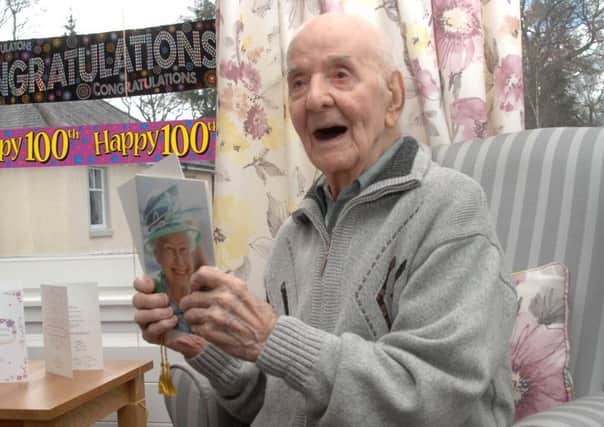D-Day veteran Frank Hogg celebrates 100th birthday


Frank, who lives at Drummond Grange Care Home in Wadingburn, Midlothian, was joined by family and friends at a special party. His only child, also Frank, had travelled from his home in Spain to help his father mark the milestone.
Among the guests were Major Jim Tilley from Frank’s old regiment, the Argyll and Sutherland Highlanders. Major Tilley brought along a piper.
Advertisement
Hide AdAdvertisement
Hide AdBorn in the West Port, on April 9, 1916, Frank was the youngest of four children.
His first job was with the Edinburgh and Dumfriesshire Dairies cleaning out the milk tanks.
He then worked for a furniture company in St Mary’s Street as a french polisher before joining his father as a carter with British Railways.
After the war Frank returned to the railway. Eventually the Clydesdales gave way to lorries and Frank drove – a skill he had learned in the war – and carried out deliveries.
Advertisement
Hide AdAdvertisement
Hide AdFor a spell he worked for Aitchison Brewery before returning to the railway where he stayed until he retired.
Frank married Mary Kelly, who worked at Martins the Bakers, in 1940. Four weeks later Frank was in the army. As well as their son Frank, the couple have grandchildren Lesley and Iain and great-grandson Joshua. Mary died in 1989.
Son Frank, 67, a former telecoms engineer, said he couldn’t explain his father’s longevity.
“As far as I know that is him. Going way back to his childhood in West Port he was in his pram until he was five years old because he couldn’t walk as he had rickets. He was a bit bow-legged but a very good footballer and boxer in the army.
Advertisement
Hide AdAdvertisement
Hide Ad“How he survived so long I don’t know. It was a physical job he did and working in all kinds of weather every day which made him quite fit. He never has anything wrong with him. He’s amazing. I might get lucky and have some of his genes.”
Frank was called up in 1940 and joined the Argylls, based in Stirling. He spent four years in Britain and did not see action in World War Two until the D-Day landings in Normany in June 1944.
He was amongst the second wave of the invasion landing at Arromanches. After moving inland, the troops moved towards Caen where they met strong resistance from a German Panzer division. Frank and his comrades were moved towards Holland.
He was part of the British troops fighting in Nijmagen and Arnhem before the arrival of the paratroops. By 1945 Frank was in Ahrensburg, Germany, but was soon deployed to the Ardennes region to join the Battle of the Bulge.
He finished the war in Hamburg and was demobbed in 1946.